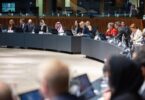NIZAMUTDINOV Andrey
Berlin and Paris decided to once again try to revive the process of implementing the Minsk agreements to resolve the situation in eastern Ukraine. German Chancellor Angela Merkel and French President Emmanuel Macron held telephone talks, first with Ukrainian President Vladimir Zelensky, and then with Russian President Vladimir Putin, and agreed to hold a “shortly” meeting of the Normandy Four foreign ministers. And after that, possibly, a new summit in the “Normandy format”.
Although I would not be in a hurry to rejoice at the new rise of this topic – about the summit, as they say, my grandmother said in two more ways; and the date of the ministerial meeting, apparently, the parties have not yet been able to agree on. The whole point is Moscow’s skepticism, where they do not see any desire on the part of Kiev for a constructive dialogue, and they consider meeting just for the sake of the meeting itself as a waste of time.
Hearing test
The activation “on the Norman track,” as diplomats like to say, was preceded by two significant signals. The first of them was an article by the Deputy Chairman of the Security Council of the Russian Federation Dmitry Medvedev, published in the Kommersant newspaper under the eloquent headline “Why are contacts with the current Ukrainian leadership pointless.”
The tone of the “polemical theses”, as the author himself described the article, turned out to be unusually harsh. Although, of course, in all kinds of talk shows with the participation of deputies, politicians and experts of the sphere, much more scathing statements are often heard, but to hear such harsh assessments from the lips of such a high-ranking statesman … However, judge for yourself.
“Ukrainian leaders, especially top officials, are people who do not have any stable self-identification.” President Zelensky is a “man turned inside out” at all. Modern Ukrainian leaders are “absolutely dependent people”, “ignorant” and “optional” who “constantly change their position to please their overseas masters and the political conjuncture.” In addition, these are “weak people who only strive to fill their pockets.” Contacts and negotiations with such people are “unproductive,” moreover, “absolutely pointless.” Well, in general: “It makes no sense for us to deal with the vassals. Business must be done with the overlord.”
It is noteworthy that the article, containing many more extremely impartial assessments and statements about the Ukrainian leadership, was published exactly before the arrival in Moscow of the US Deputy Secretary of State for Political Affairs Victoria Nuland. And this, I think, is no coincidence, but a second clear signal addressed to Kiev and the Europeans: a representative of the “suzerain” arrives, so we will talk to him.
The significant significance of this signal is also explained by the fact that Washington was interested in Nuland’s arrival in Moscow. And for the visit to take place, they even agreed to a compromise: they gave a visa to a Russian diplomat in exchange for permission for the “non-entry” Nuland to come to Russia.
Signals received
Judging by how rapidly subsequent events developed, the signals were received and understood both in Kiev and in European capitals. Medvedev’s article appeared on the morning of October 11, and by the evening of the same day, a series of telephone conversations took place, as a result of which a principled agreement was reached to hold a meeting of the Foreign Ministers of the Normandy Four in order to discuss, ” Normandy Summit “.
By and large, Kiev in this case has once again demonstrated the very change of positions for the sake of the political conjuncture, which was mentioned in Medvedev’s article. The fact is that the results of a recent personal meeting with US President Joe Biden, which Zelenskiy so sought, caused disappointment and anxiety among the Ukrainian authorities. It turned out that the Democratic administration does not at all seek to embrace Ukraine. Instead of a rain of gold – stingy handouts, instead of admission to NATO – reminders of the need to continue reforms, instead of sanctions against Nord Stream 2 and firm guarantees of preserving the transit of Russian gas – evasive promises to assist and recommendations to turn to Germany. In addition, to Zelensky’s passionate calls and active attempts to involve the United States in the process of resolving the conflict in Donbass, Washington reacted indistinctly, without saying yes or no. And after all these “instead of”, Nuland also goes to Moscow, where, perhaps, he will begin to agree on something behind the back of Ukraine. There is only one way out – to urgently rush to bow to the Europeans.
Europeans have their own reasons for this story. Merkel stood at the origins of the “Normandy format” and now, completing her long-term tenure as chancellor, I think she would not mind showing some kind of success, and not leaving a half-dead mechanism to his successor. Macron has presidential elections next year, and international success will not hinder him at all.
Well, let’s not forget about personal scores. After all, it was Nuland who, eight years ago, largely contributed to the fact that the “Euromaidan” changed its orientation and direct protégés of the United States, not Europe, came to power in Ukraine. And it was Nuland who, in response to concerns that the Europeans might not like such a change in orientation, sent the European Union to a well-known address. And if now there is an opportunity to play a response scenario, it would be a sin not to use it.
A worn-out record
It must be admitted that Kiev has been pushing for a new summit in the “Normandy format” for over a year already. In response, Moscow said that, for a start, it would be good to fulfill the agreements reached at the previous meeting in Paris. Germany and France seemed to share this opinion, but now they decided to speed up the preparations for a new summit.
The fact is that this purely opportunistic change in the vector does not change anything in the real positions of the parties. Yes, Zelensky, in the course of telephone conversations, seems to have confirmed his adherence to the Minsk agreements as an uncontested basis for a settlement in Donbass. But even before that, he either swore fidelity to the agreements, sometimes demanded their radical revision and frightened him out of them if his demands were not met. And most importantly, the president and the Ukrainian authorities as a whole did absolutely nothing to fulfill the political part of the document, on the contrary, they tried in every possible way to hinder its implementation.
The same story is with the Europeans: during the telephone conversations of the leaders of the Normandy Quartet, Merkel and Macron insisted in every possible way on the need to implement the Minsk agreements, the same was said at the Ukraine-EU summit held this week in Kiev. However, neither Berlin, nor Paris, nor Brussels reproached the Ukrainian authorities with a word for not fulfilling their obligations. On the contrary, with the monotony of a worn-out record, they continued to demand that Russia recognize itself as a party to the conflict and “fulfill the Minsk agreements in full.” “Apparently, they believe that Moscow can, instead of Kiev, grant Donbass a special status within Ukraine, declare amnesty to the residents of Donetsk and Lugansk and carry out a constitutional reform in Ukraine with an emphasis on decentralizing its territorial structure,”
Promised to leave
By the way, at the Moscow talks between Nuland and Deputy Chief of Staff of the Russian President Dmitry Kozak, the American side also confirmed that it considers the Minsk agreements the only basis for resolving the situation in eastern Ukraine and considers their full implementation a condition of “restoring peace, stability and Ukrainian sovereignty in Donbass.” After that, Zakharova expressed the hope that Kiev would hear “a signal from their direct curator Victoria Nuland.”
Alas, practice shows that the Ukrainian authorities prefer to hear only what is beneficial to them. Therefore, there is every reason to believe that the upcoming meetings within the framework of the “Normandy format” (if they do take place) they will try to use to revise the Minsk agreements and put forward some new requirements, for example, linking agreements with guarantees of preserving Russian gas transit, which annually brings Ukraine, according to Zelensky, is “legitimate” $ 2 billion (for the Ukrainian treasury in its current state, this is a huge amount).
Perhaps that is why the timing of the meeting of the Normandy Quartet foreign ministers is proceeding with a creak. And as for the summit of the leaders of the four countries, the press secretary of the President of the Russian Federation Dmitry Peskov prefers to speak of it as an “eventual” event, which will either take place or not.
According to Boris Gryzlov, the plenipotentiary representative of Russia in the Contact Group for the settlement of the situation in eastern Ukraine, “it is generally unclear what outcome of a possible summit Kiev is counting on, if none of the decisions of the previous summit has been implemented, and the situation in the Contact Group and on the ground continues through the efforts of Kiev itself. degrade”. Outside the negotiating platform, representatives of Kiev declare their adherence to the Minsk agreements, and in the Contact Group itself they are trying in every possible way to exclude Donetsk and Lugansk from the negotiations and generally do not hide their intentions to lead them to a dead end on all aspects of the settlement, especially the political one.
It remains only to quote the above-mentioned article by Medvedev: “How in such a situation <…> it is possible to negotiate and negotiate? Nothing.”
Incidentally, in the very days when the leaders of the Normandy Four were discussing the possibility of a new summit, Zelensky’s promise to leave the post of head of state was exactly one year old if he fails to end the armed conflict in Donbass. “I immediately said that I did not cling to ratings or power. If I cannot end the war, then another person must come,” the Ukrainian president said a year ago in an interview with the BBC TV channel.
A year later, the tone has changed: now Zelenskiy says that one term as president may not be enough for him to fulfill these promises, so he is considering the possibility of running for a second.
Well, a well-known Russian proverb says: “They wait for the promised for three years, but refuse for the fourth.” A year has already passed. And if you count from the moment he took office, which Zelensky took, not least thanks to promises to end the conflict in Donbass, then it is already almost two and a half years. The waiting time is running out.
Courtesy: (TASS)






